The AMD Ryzen 5 2500X and Ryzen 3 2300X CPU Review
by Ian Cutress on February 11, 2019 11:45 AM ESTGaming: Grand Theft Auto V
The highly anticipated iteration of the Grand Theft Auto franchise hit the shelves on April 14th 2015, with both AMD and NVIDIA in tow to help optimize the title. GTA doesn’t provide graphical presets, but opens up the options to users and extends the boundaries by pushing even the hardest systems to the limit using Rockstar’s Advanced Game Engine under DirectX 11. Whether the user is flying high in the mountains with long draw distances or dealing with assorted trash in the city, when cranked up to maximum it creates stunning visuals but hard work for both the CPU and the GPU.
For our test we have scripted a version of the in-game benchmark. The in-game benchmark consists of five scenarios: four short panning shots with varying lighting and weather effects, and a fifth action sequence that lasts around 90 seconds. We use only the final part of the benchmark, which combines a flight scene in a jet followed by an inner city drive-by through several intersections followed by ramming a tanker that explodes, causing other cars to explode as well. This is a mix of distance rendering followed by a detailed near-rendering action sequence, and the title thankfully spits out frame time data.
There are no presets for the graphics options on GTA, allowing the user to adjust options such as population density and distance scaling on sliders, but others such as texture/shadow/shader/water quality from Low to Very High. Other options include MSAA, soft shadows, post effects, shadow resolution and extended draw distance options. There is a handy option at the top which shows how much video memory the options are expected to consume, with obvious repercussions if a user requests more video memory than is present on the card (although there’s no obvious indication if you have a low end GPU with lots of GPU memory, like an R7 240 4GB).
| AnandTech CPU Gaming 2019 Game List | ||||||||
| Game | Genre | Release Date | API | IGP | Low | Med | High | |
| Grand Theft Auto V | Open World | Apr 2015 |
DX11 | 720p Low |
1080p High |
1440p Very High |
4K Ultra |
|
All of our benchmark results can also be found in our benchmark engine, Bench.
| AnandTech | IGP | Low | Medium | High |
| Average FPS | 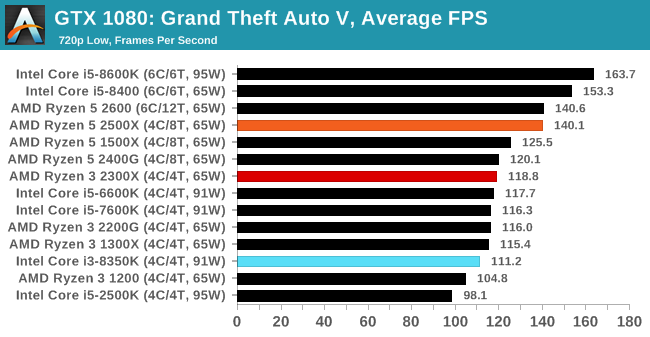 |
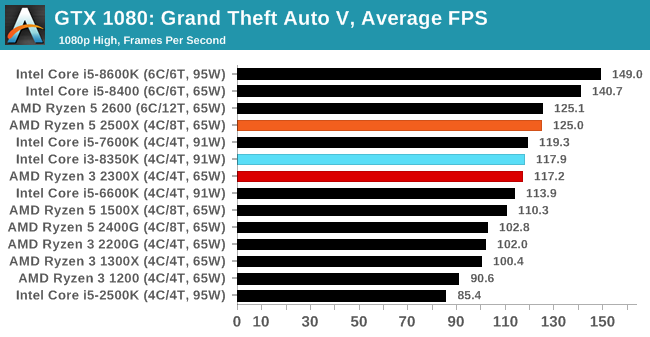 |
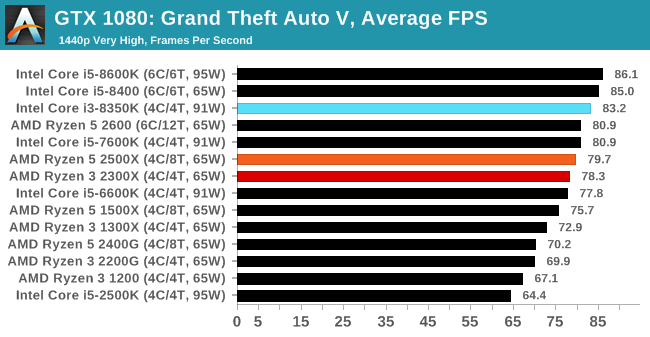 |
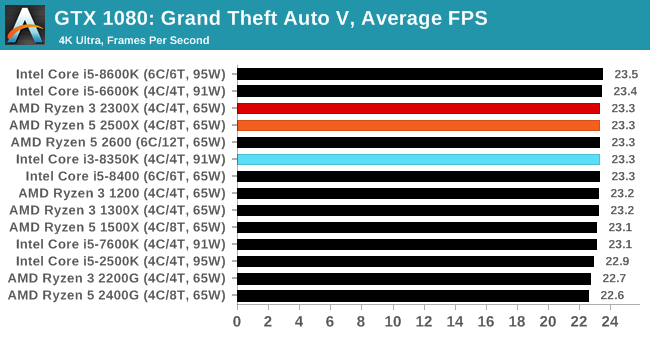 |
| 95th Percentile | 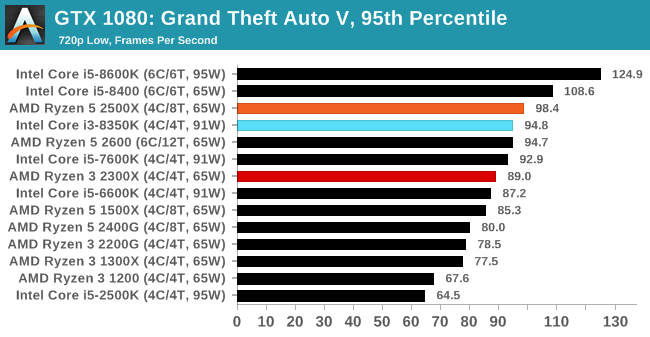 |
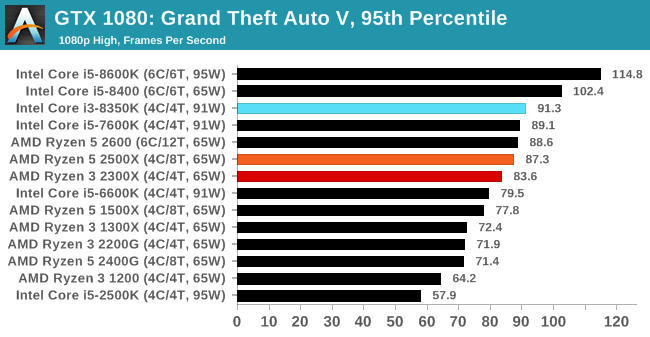 |
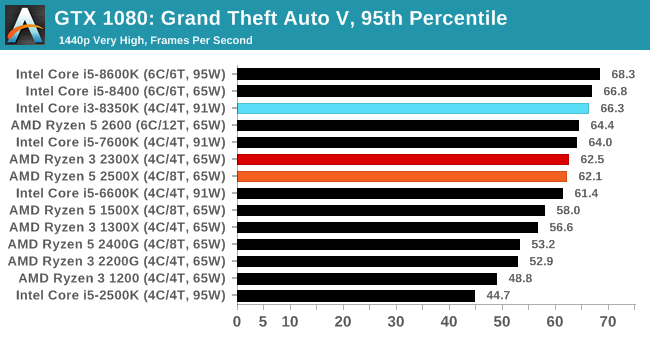 |
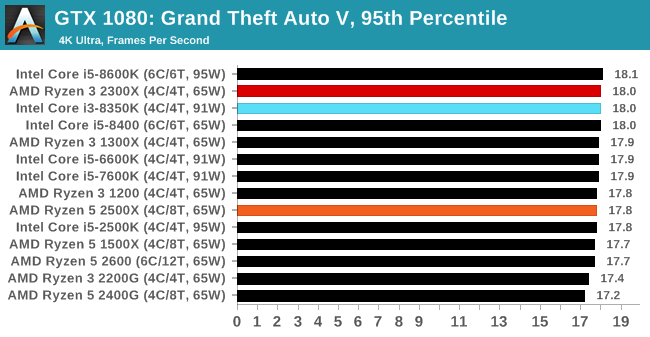 |
At 720p and 1080p, the Ryzen 5 2500X has the lead, while at 1440p the 8350K goes ahead. At 4K, all chips are equal.












65 Comments
View All Comments
romrunning - Monday, February 11, 2019 - link
It may just be me, but all of the links on the "Pages In This Review" at the bottom of the main page simply return me to the main page.romrunning - Monday, February 11, 2019 - link
But the drop-down to the specific page works as expected.evilspoons - Monday, February 11, 2019 - link
It's definitely not just you. I spent a few tries wondering what I was doing wrong and re-read the start of the article until I tried the drop-down menu instead of the links.Ian Cutress - Monday, February 11, 2019 - link
That's my fault, as the hyperlinks need to be manually added. I had messed up the part of the URL after the /show/13945. It should be fixed now.Kevin G - Monday, February 11, 2019 - link
I noticed this as well.IGTrading - Monday, February 11, 2019 - link
Thank you Ian for a good review.I completely agree with the conclusion that the 2300X makes perfect sense, but the 2500X is harder to place in the picture ...
On the other hand, despite 2400G and the 2500X have the same TDP, if I look at the graph with full load power consumption, I can clearly see that the latter has a very generous thermal limit, compared with the 2400G where the thermal envelope seems to be very strictly limited.
Meaning OEMs will probably be able to use the 2500X for cheaper gaming systems where auto-overclocking is used as a feature and AMD will thus be able to offer something better for a lower price.
This also allows AMD to push AM4 harder on the market, giving itself the opportunity to future upgrades for AM4 buyers.
So the 2500X will show considerably better performance than the 2400G despite the similar config (minus the iGPU) while not cannibalizing the 2600 nor the 2400G.
If AMD manages to sell more 2500X through OEMs, AMD also builds a future upgrade market for itself, unlike Intel that will likely push buyers into purchasing new machines.
dromoxen - Monday, February 11, 2019 - link
ppl buying these CPUs are not the sort to be upgrading the CPU.. to most the computer is a closed box and is upgraded as a whole . I do wonder where all these cores are going .. I mean its great to have 4 6 8 cores with another 8 hyperthreads .. but who is using all that power ? Lets make 4 cores the absolute limit , unless you have a Govt permit to purchase more.GreenReaper - Monday, February 11, 2019 - link
Browsers have been getting a lot better at using multiple cores, and websites surely do enough in the background nowadays to justify the effort.RadiclDreamer - Tuesday, February 12, 2019 - link
Why would there be any limit on how man cores? Whats it to you that I want to transcode movies faster, or multitask more, or anything else? And government permit to have more? Thats just insane.kaidenshi - Tuesday, February 12, 2019 - link
He's trolling like he always does. Anything to get under someone's skin enough to get a reaction out of them.